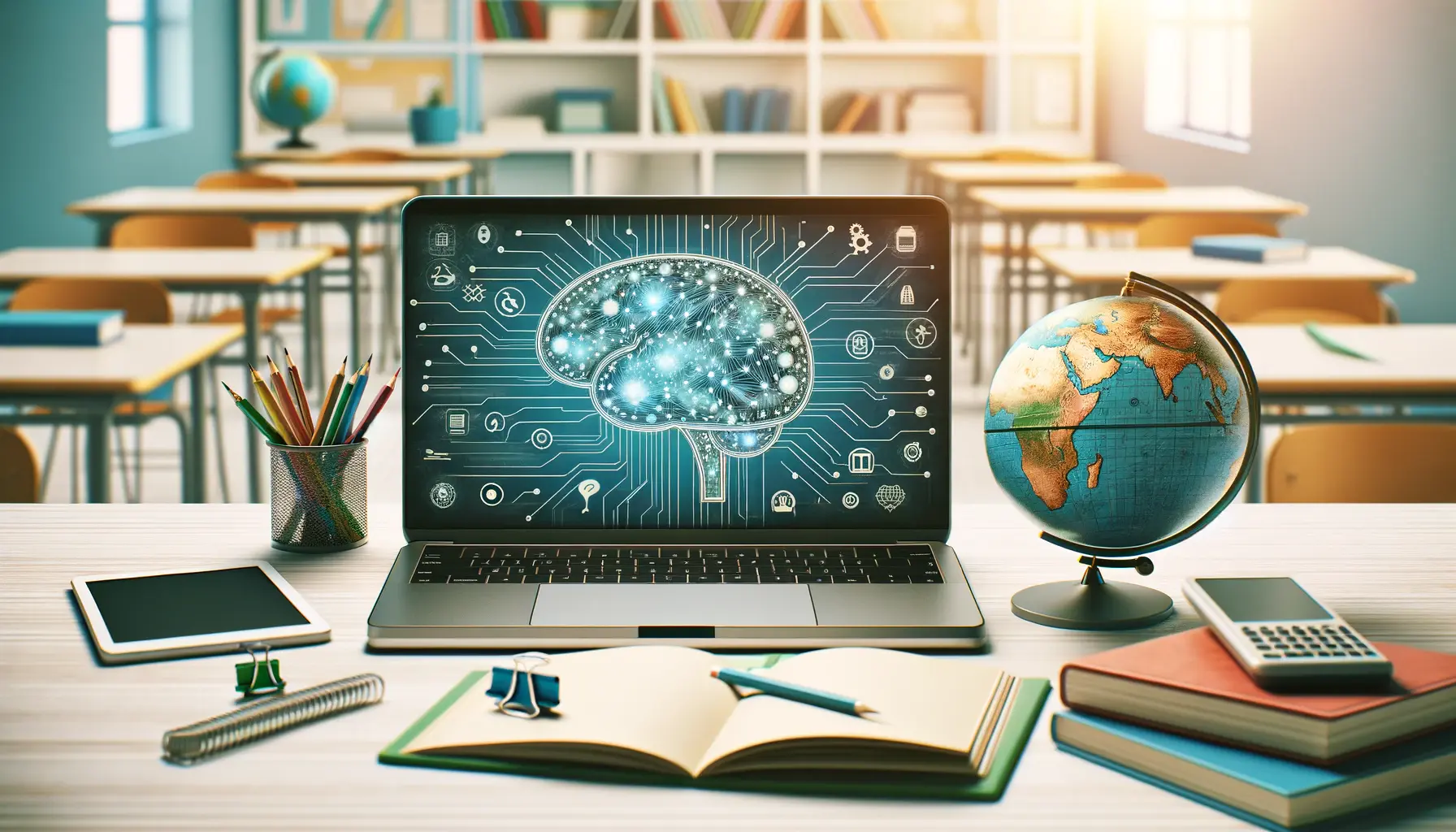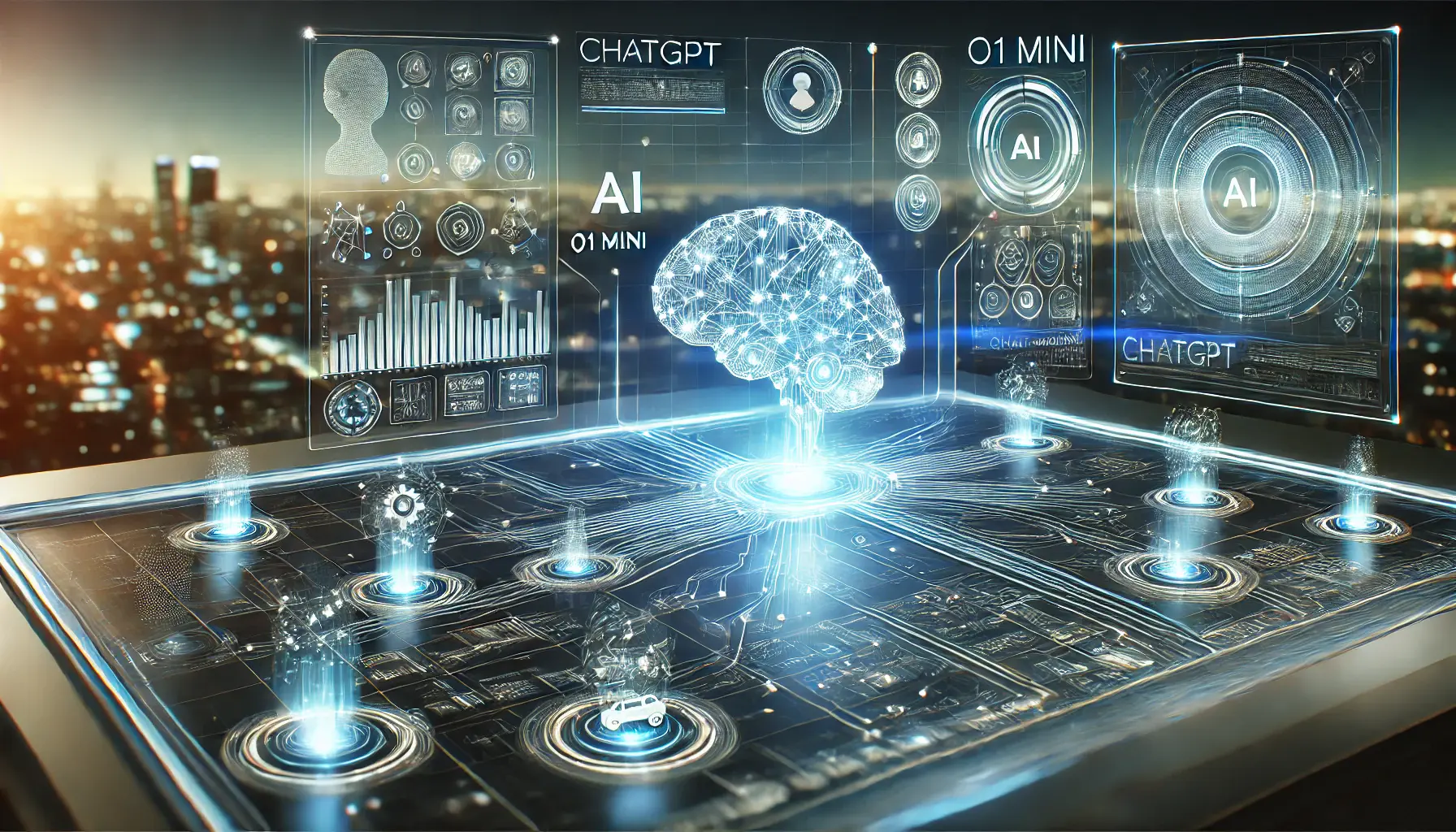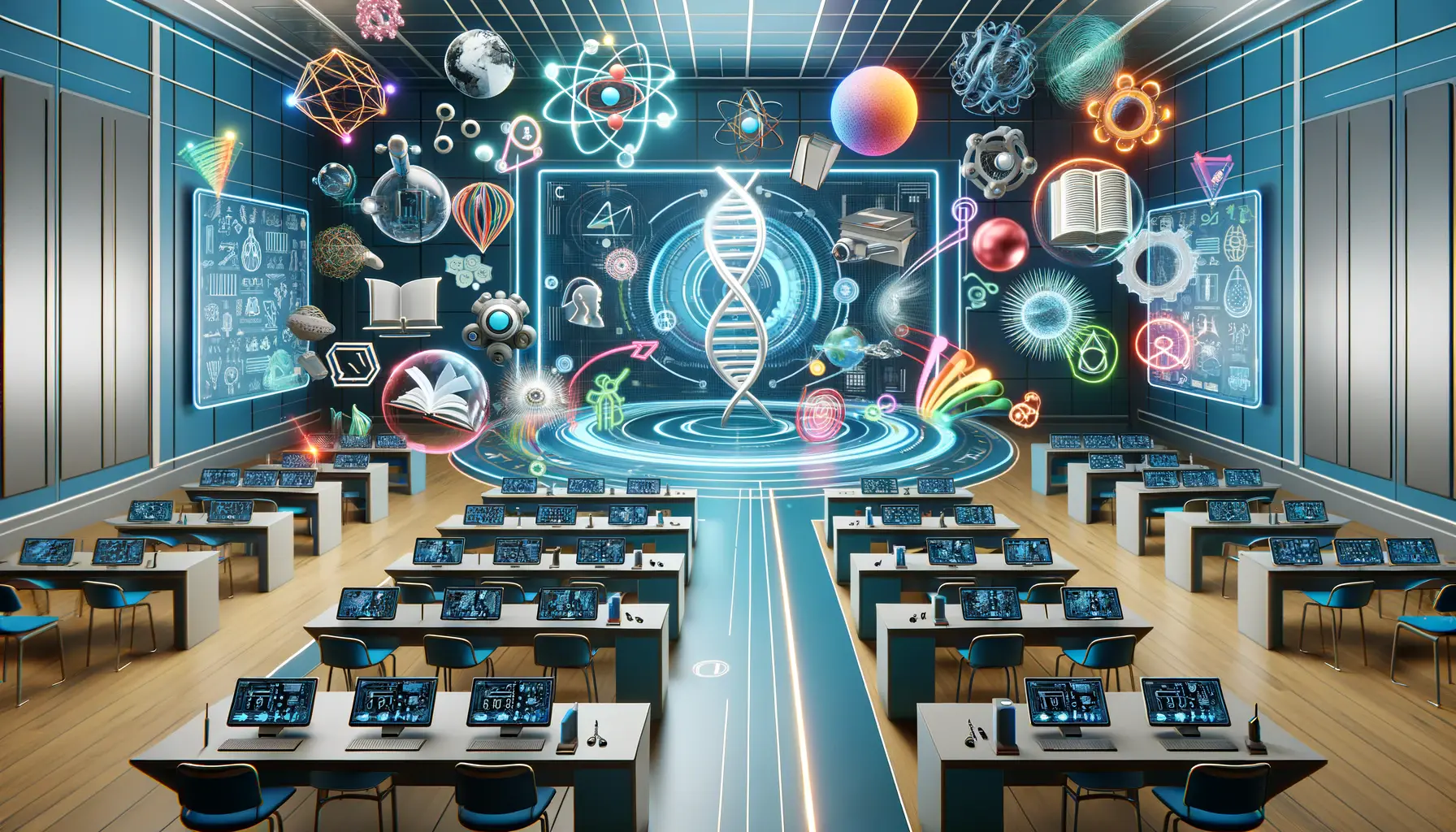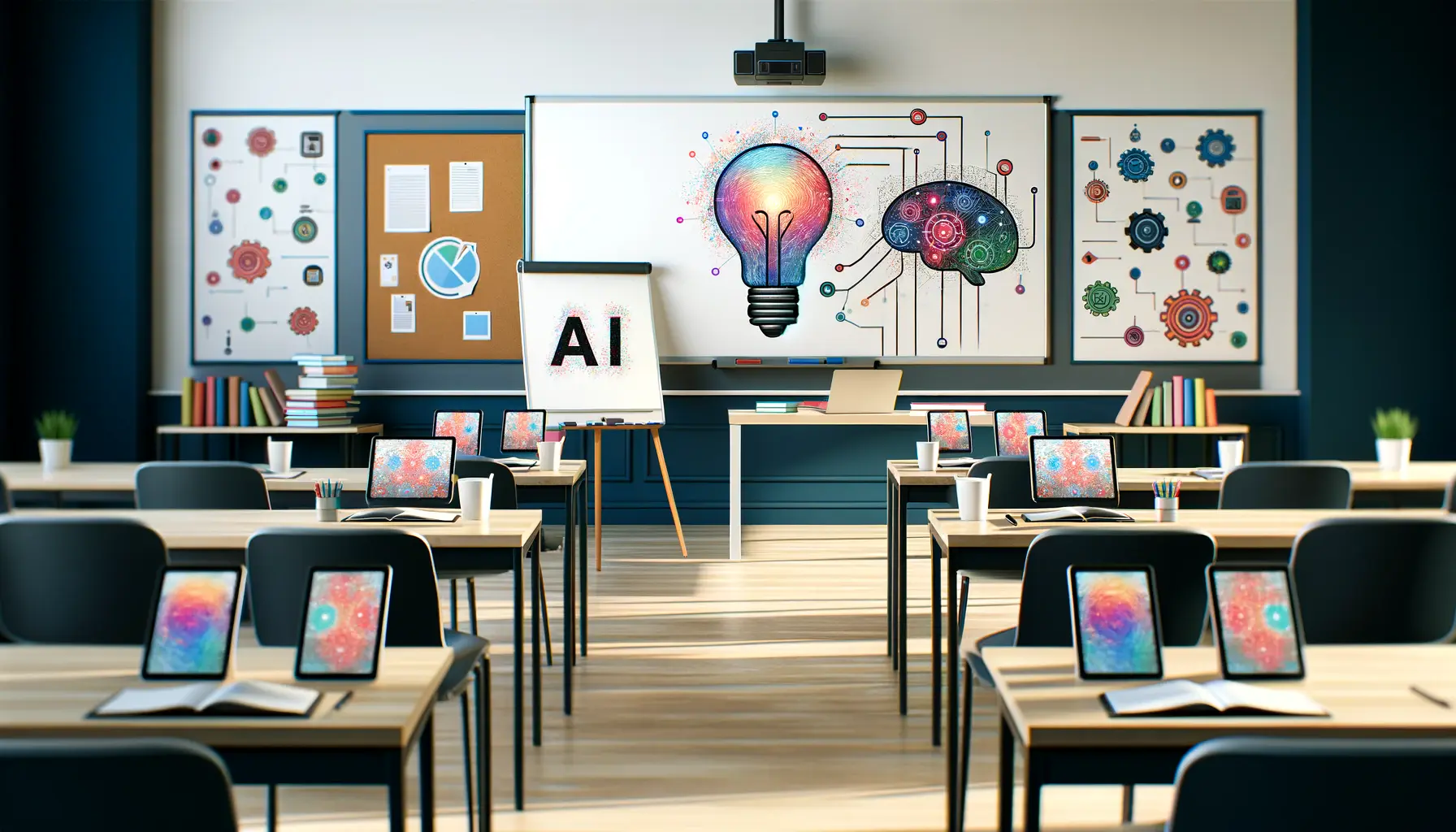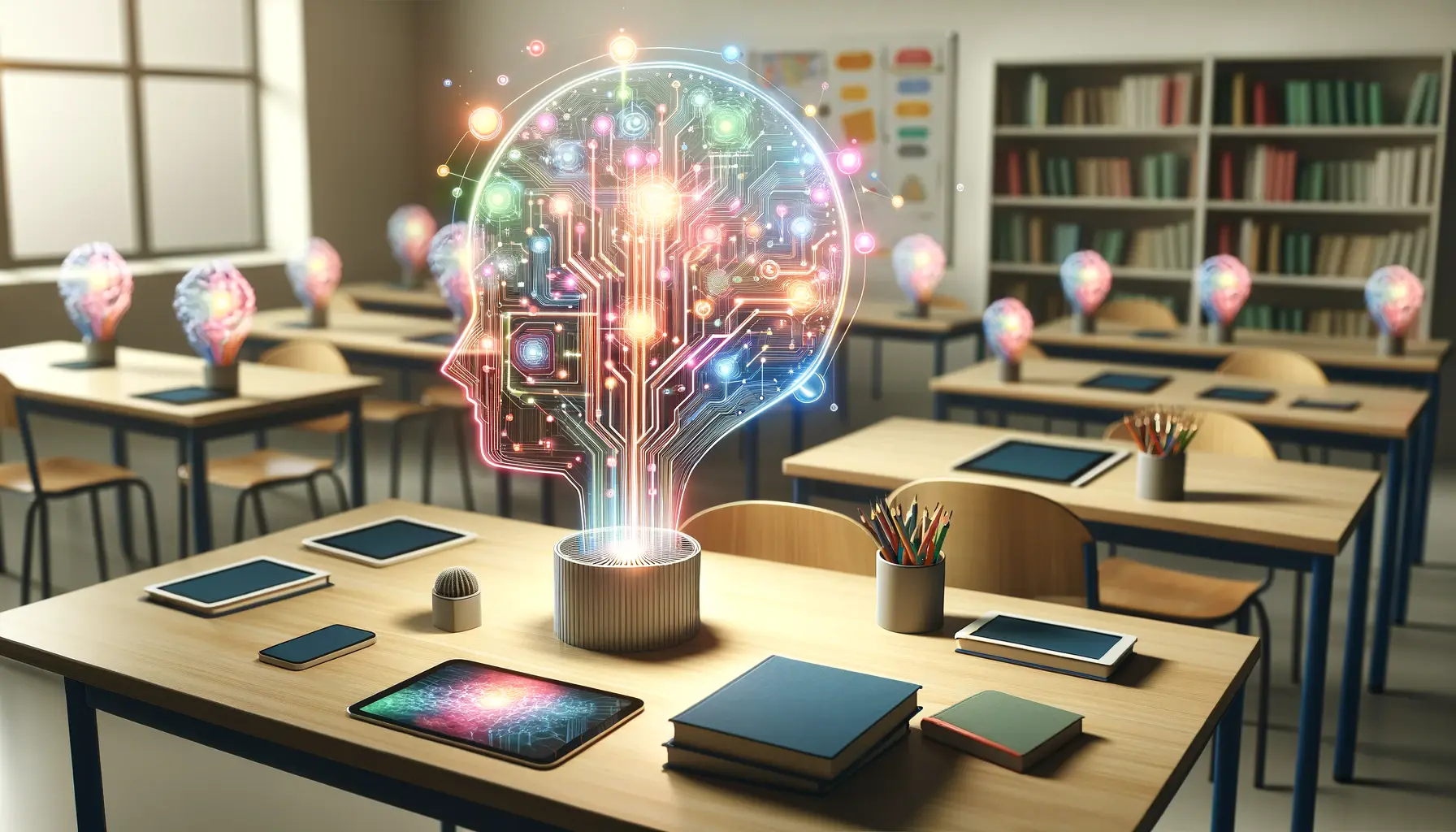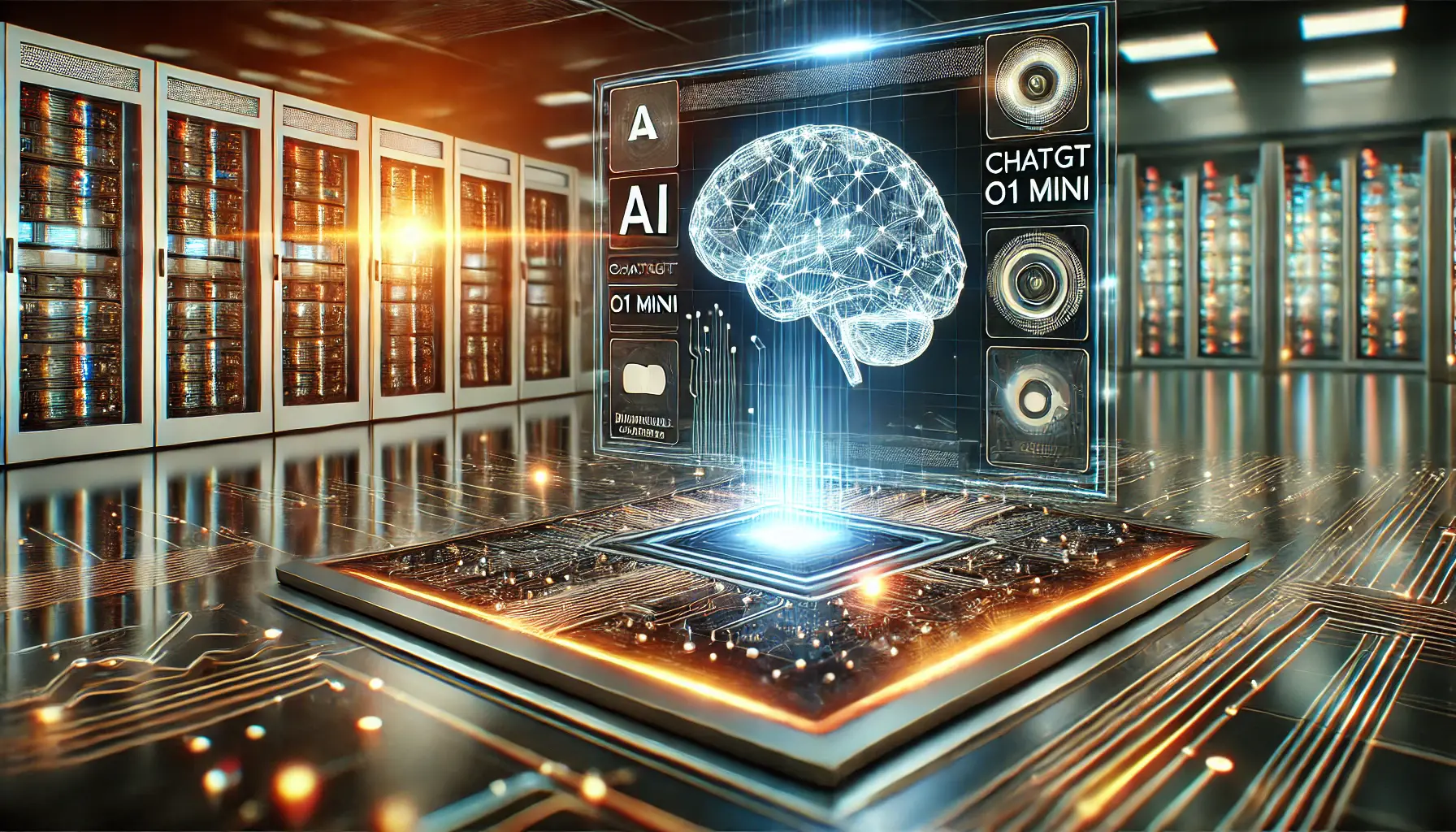The advent of ChatGPT 4 has marked a significant milestone in the realm of educational technology, offering unprecedented opportunities for enhancing teaching and learning processes.
This iteration of OpenAI’s language model has been designed with advanced capabilities to understand, respond, and interact in ways that closely mimic human-like conversation, making it an invaluable tool for educators and students alike.
The integration of ChatGPT 4 into educational settings promises to revolutionize traditional methodologies, fostering a more interactive, personalized, and accessible learning environment.
Education, as a sector, is perpetually in pursuit of innovation that can bring about substantial improvements in teaching efficacy and learning outcomes.
ChatGPT 4, with its sophisticated algorithms and vast knowledge base, stands at the forefront of this educational evolution.
It not only serves as a resource for information but also as a platform for developing critical thinking, creativity, and problem-solving skills among learners.
By leveraging ChatGPT 4, educators can create more engaging and diverse educational experiences that cater to the varied needs of their students.
- Understanding ChatGPT 4’s Role in Education
- Curriculum Development and Customization
- Assessment and Feedback Mechanisms
- Facilitating Collaborative Learning
- Supporting Diverse Learning Needs
- Enhancing Lifelong Learning and Professional Development
- Challenges and Ethical Considerations
- Embracing the Future of Education with ChatGPT 4
- ChatGPT 4 for Education: Frequently Asked Questions
Understanding ChatGPT 4’s Role in Education
The integration of ChatGPT 4 into the educational landscape is not just about the adoption of new technology; it’s about reimagining the way education is delivered and received.
At its core, ChatGPT 4 serves as both a facilitator and an enhancer of learning, capable of providing instant access to a wealth of information across various subjects.
This accessibility to information makes it a powerful tool for supplementing traditional teaching methods, enabling students to explore topics in depth and at their own pace.
Moreover, ChatGPT 4’s ability to generate personalized content and feedback presents a unique opportunity for differentiated instruction.
Educators can utilize this feature to cater to the individual learning styles and needs of their students, thereby promoting a more inclusive learning environment.
Whether it’s through customized study materials, practice exercises, or interactive discussions, ChatGPT 4 can adapt to serve a wide range of educational purposes, making learning more engaging and effective for everyone involved.
Enhancing Teacher-Student Interaction
One of the most significant impacts of ChatGPT 4 in education is its potential to enhance the interaction between teachers and students.
By automating routine tasks such as grading and providing basic information, educators can allocate more time to meaningful interactions with their students.
This shift not only reduces the workload on teachers but also allows for more personalized attention to students, fostering a stronger teacher-student relationship.
In addition, ChatGPT 4 can serve as an interactive platform for students to ask questions and receive immediate feedback.
This instantaneity encourages a more dynamic learning environment where students feel more connected and engaged with the material.
The ability of ChatGPT 4 to understand and respond to a wide range of queries makes it an ideal companion for learners, promoting curiosity and a deeper understanding of the subject matter.
ChatGPT 4’s role in education extends beyond just a source of information; it acts as a catalyst for interactive learning and personalized education, making it a pivotal tool in the modern educational toolkit.
Curriculum Development and Customization
The advent of ChatGPT 4 has introduced a new dimension to curriculum development and customization, enabling educators to tailor educational content to meet the diverse needs of their students.
This technology’s ability to process and generate content based on vast amounts of data allows for the creation of highly personalized learning materials.
Such customization is pivotal in addressing the varied learning styles and paces of students, ensuring that each individual can engage with the curriculum in the most effective manner possible.
Furthermore, ChatGPT 4’s flexibility and adaptability make it an invaluable asset in developing interdisciplinary learning experiences.
By integrating information from various fields, educators can create comprehensive curricula that encourage holistic learning.
This approach not only enriches the educational experience but also prepares students for the complexities of real-world problems by fostering critical thinking and problem-solving skills.
Key Benefits of Curriculum Customization with ChatGPT 4
- Personalized Learning Paths: ChatGPT 4 can analyze a student’s performance and learning style to suggest personalized learning paths. This ensures that each student can learn at their own pace, focusing on areas that require additional attention.
- Dynamic Content Generation: The ability to generate dynamic content allows educators to keep the curriculum up-to-date with the latest information and trends, making learning more relevant and engaging for students.
- Interdisciplinary Learning: ChatGPT 4 facilitates the creation of interdisciplinary learning experiences by seamlessly integrating concepts from different subjects. This approach helps students make connections between various fields of study, enhancing their overall understanding and application of knowledge.
Implementing ChatGPT 4 in Lesson Planning
Incorporating ChatGPT 4 into lesson planning can significantly enhance the educational experience by providing a rich repository of resources and tools for educators.
From generating creative writing prompts to solving complex mathematical problems, ChatGPT 4 can assist in creating diverse and interactive lesson plans.
This versatility not only aids in delivering a more engaging learning experience but also supports educators in exploring new teaching methodologies.
Moreover, the use of ChatGPT 4 in lesson planning encourages a more collaborative learning environment.
Students can interact with the AI to explore topics of interest, work on group projects, or engage in discussions.
This level of interaction promotes active learning and encourages students to take ownership of their educational journey, making learning a more immersive and enjoyable experience.
Incorporating ChatGPT 4 into curriculum development and lesson planning represents a shift towards a more personalized, dynamic, and interactive approach to education, highlighting the model’s potential to significantly enhance teaching and learning outcomes.
Assessment and Feedback Mechanisms
The integration of ChatGPT 4 into educational systems revolutionizes the approach to assessments and feedback, offering a more nuanced and immediate evaluation of student performance.
This AI model’s capability to understand and generate human-like text allows for the creation of sophisticated assessment tools that can provide personalized feedback to students.
Such advancements not only streamline the evaluation process but also enhance the learning experience by offering constructive feedback that students can act upon in real-time.
Moreover, ChatGPT 4’s adaptability means it can be used across various subjects and learning levels, making it a versatile tool for assessing a wide range of competencies.
From language proficiency tests to complex problem-solving exercises, ChatGPT 4 can tailor assessments to fit the educational goals of each course, providing a comprehensive overview of student learning outcomes.
Personalized Feedback for Enhanced Learning
- Immediate Response: ChatGPT 4 can provide instant feedback on assignments and quizzes, allowing students to understand their mistakes and learn from them immediately. This immediacy helps maintain student engagement and facilitates a continuous learning cycle.
- Detailed Explanations: Unlike traditional assessment tools, ChatGPT 4 can offer detailed explanations and suggestions for improvement, catering to the individual learning needs of each student. This personalized approach helps students grasp complex concepts more effectively.
- Encouragement and Motivation: By providing positive reinforcement and constructive feedback, ChatGPT 4 can play a significant role in motivating students to persevere and improve their skills. This encouragement is crucial for maintaining student morale and fostering a positive learning environment.
Streamlining the Grading Process
ChatGPT 4’s application extends to streamlining the grading process, significantly reducing the workload on educators.
By automating the grading of objective assignments and providing preliminary assessments of subjective ones, educators can allocate more time to personalized instruction and addressing the unique needs of their students.
This efficiency not only benefits teachers but also ensures that students receive timely feedback, crucial for their academic development.
The potential of ChatGPT 4 to transform assessment and feedback mechanisms in education is immense.
Its ability to provide personalized, immediate, and detailed feedback represents a shift towards a more student-centered approach to learning.
By leveraging this technology, educators can enhance the assessment process, making it more reflective of individual learning journeys and more conducive to student growth.
The transformative power of ChatGPT 4 in assessments lies in its ability to personalize feedback and streamline grading, marking a significant advancement in educational evaluation methods.
Facilitating Collaborative Learning
Collaborative learning, a cornerstone of modern pedagogical strategies, emphasizes the importance of interaction and cooperation among students to enhance the learning experience.
ChatGPT 4, with its advanced language processing capabilities, emerges as a powerful tool to facilitate this collaborative learning environment.
By enabling real-time communication and providing a platform for group discussions, ChatGPT 4 can significantly enhance the dynamics of collaborative learning, making it more engaging and effective.
Moreover, ChatGPT 4’s ability to simulate conversation and generate diverse perspectives on a topic can stimulate critical thinking and debate among students.
This interaction not only enriches the learning process but also fosters a sense of community and teamwork within the classroom.
The AI’s involvement in collaborative projects encourages students to explore new ideas and approaches, enhancing their problem-solving skills and creativity.
Supporting Group Projects and Discussions
- Role as a Facilitator: ChatGPT 4 can act as a facilitator in group projects, guiding discussions, offering suggestions, and providing relevant information. This role helps maintain focus and productivity, ensuring that group activities are aligned with learning objectives.
- Encouraging Participation: By posing questions and challenges, ChatGPT 4 can encourage participation from all group members, ensuring that every student has the opportunity to contribute. This inclusivity is vital for a successful collaborative learning experience.
- Providing Diverse Perspectives: ChatGPT 4 can introduce diverse perspectives and ideas into discussions, challenging students to think critically and consider different viewpoints. This diversity enriches the learning experience and promotes a deeper understanding of the subject matter.
Enhancing Communication Skills
Collaborative learning facilitated by ChatGPT 4 also plays a crucial role in enhancing students’ communication skills.
By engaging in discussions and group projects, students learn to articulate their thoughts clearly, listen actively, and respond constructively.
These communication skills are essential not only in academic settings but also in professional and personal contexts, making them invaluable for student development.
The integration of ChatGPT 4 into collaborative learning initiatives represents a significant advancement in educational technology.
Its ability to support group interactions, stimulate discussion, and enhance communication skills makes it an indispensable tool for modern education.
Through ChatGPT 4, educators can create a more dynamic, inclusive, and effective learning environment that prepares students for the challenges of the future.
ChatGPT 4’s role in facilitating collaborative learning underscores its potential to transform educational practices, making learning more interactive, inclusive, and effective.
Supporting Diverse Learning Needs
The educational landscape is increasingly recognizing the importance of catering to diverse learning needs to ensure that all students have the opportunity to succeed.
ChatGPT 4, with its advanced AI capabilities, stands out as a pivotal tool in this endeavor.
It offers personalized learning experiences that can adapt to the unique preferences, strengths, and challenges of each student.
This adaptability is crucial for supporting students with different learning styles, abilities, and pace, making education more inclusive and equitable.
Furthermore, ChatGPT 4’s ability to generate content in various formats (text, quizzes, interactive discussions) allows educators to present information in ways that best suit the learning preferences of their students.
This flexibility ensures that learning materials are accessible and engaging for everyone, regardless of their learning style or cognitive abilities.
Addressing Special Educational Needs
- Customized Learning Materials: ChatGPT 4 can create customized learning materials that cater to the specific needs of students with disabilities or learning difficulties. This customization can include simplified texts, extended explanations, or interactive exercises that make learning more accessible.
- Language Support: For students who are non-native speakers or those struggling with language barriers, ChatGPT 4 can provide translations and language support, helping them to better understand the curriculum and participate in classroom activities.
- Emotional and Social Support: ChatGPT 4 can also offer emotional and social support by engaging students in conversations that build confidence, encourage persistence, and foster a sense of belonging in the educational community.
Enhancing Engagement and Motivation
Engagement and motivation are key factors in successful learning outcomes.
ChatGPT 4 contributes significantly to these aspects by providing interactive and enjoyable learning experiences.
Through personalized challenges, gamified learning activities, and positive reinforcement, ChatGPT 4 can keep students engaged and motivated throughout their educational journey.
This engagement is particularly important for students who may feel disconnected from traditional teaching methods or who struggle to maintain interest in their studies.
The role of ChatGPT 4 in supporting diverse learning needs is a testament to the potential of AI in creating more inclusive and adaptive educational environments.
By leveraging this technology, educators can ensure that all students, regardless of their individual challenges, have the tools and support they need to achieve their full potential.
ChatGPT 4’s ability to support diverse learning needs highlights its importance in building a more inclusive and personalized educational landscape.
Enhancing Lifelong Learning and Professional Development
Lifelong learning and professional development have become increasingly important in today’s rapidly changing world.
The ability to acquire new skills and adapt to evolving industries is crucial for both personal growth and career advancement.
ChatGPT 4, with its vast repository of knowledge and learning resources, emerges as a vital tool for individuals seeking to enhance their lifelong learning journey.
Its capacity to provide instant access to information, tutorials, and expert insights makes it an invaluable asset for continuous education and skill development.
Moreover, ChatGPT 4’s interactive nature encourages active learning, allowing users to engage in dialogues, ask questions, and receive personalized advice.
This interactive approach not only makes learning more engaging but also more effective, as it caters to the learner’s curiosity and specific interests.
Facilitating Professional Development
- Access to Expert Knowledge: ChatGPT 4 can simulate conversations with experts in various fields, providing insights and advice that are typically hard to access. This feature is particularly beneficial for professionals looking to deepen their expertise or pivot to new areas.
- Soft Skills Enhancement: Beyond technical knowledge, ChatGPT 4 can also help individuals develop soft skills such as communication, leadership, and problem-solving. Through interactive scenarios and role-playing exercises, users can practice and refine these essential skills.
- Staying Updated with Industry Trends: ChatGPT 4 can keep users informed about the latest trends and developments in their field, ensuring they remain competitive in the job market. This continuous learning is essential for professional growth and success.
Supporting Career Transitions
For those looking to change careers or re-enter the workforce, ChatGPT 4 offers support by providing information on required qualifications, skill-building resources, and advice on navigating the job market.
Its ability to tailor resources to the individual’s goals and interests makes it an effective coach for career development.
Additionally, ChatGPT 4 can assist in resume building, interview preparation, and networking strategies, further supporting individuals in their professional journey.
The impact of ChatGPT 4 on lifelong learning and professional development is profound.
It democratizes access to education and knowledge, making it easier for individuals to pursue their learning goals and advance their careers.
By embracing ChatGPT 4, learners and professionals alike can navigate the challenges of the modern world with confidence, equipped with the skills and knowledge necessary for success.
Assuming that ChatGPT 4 alone can replace traditional education or professional training is a misconception. Instead, it should be viewed as a complementary tool that enhances learning and development efforts.
Challenges and Ethical Considerations
While the benefits of ChatGPT 4 in education are manifold, it is crucial to address the challenges and ethical considerations that accompany its integration into learning environments.
As with any technology, there are concerns regarding data privacy, the accuracy of information, and the potential for misuse.
Ensuring the responsible use of ChatGPT 4 involves addressing these issues head-on, establishing guidelines and safeguards that protect users while maximizing the educational benefits of the AI.
Moreover, the reliance on AI for educational purposes raises questions about the development of critical thinking and problem-solving skills.
Educators must strike a balance between leveraging ChatGPT 4’s capabilities and fostering independent thought and creativity among students.
This balance is essential for preparing students to navigate a world where technology and human ingenuity intersect.
Data Privacy and Security
- Protecting Student Information: Implementing robust data protection measures is paramount to safeguarding student information. Educators and institutions must ensure that the use of ChatGPT 4 complies with privacy laws and regulations, maintaining the confidentiality and security of personal data.
- Transparency in AI Use: Transparency about how ChatGPT 4 processes and generates responses is necessary to build trust among users. Educators should be clear about the AI’s capabilities and limitations, ensuring that students and parents are informed about its role in the educational process.
Ensuring Content Accuracy and Reliability
Given that ChatGPT 4 generates responses based on its training data, there is a risk of disseminating inaccurate or biased information.
Educators must therefore critically evaluate the content produced by ChatGPT 4, supplementing it with verified sources when necessary.
Encouraging students to question and verify the information they receive fosters critical thinking and digital literacy skills, which are invaluable in the information age.
The integration of ChatGPT 4 into education is not without its challenges and ethical dilemmas.
However, by navigating these concerns with care and consideration, educators can harness the full potential of this technology to enrich the learning experience.
The key lies in using ChatGPT 4 as a tool to complement, not replace, traditional educational methods, ensuring that students benefit from both technological advancements and the irreplaceable value of human interaction and guidance.
The thoughtful integration of ChatGPT 4 into educational settings requires careful consideration of ethical, privacy, and pedagogical challenges to ensure it serves as a beneficial and enriching tool for learning.
Embracing the Future of Education with ChatGPT 4
The exploration of ChatGPT 4’s role in education reveals a landscape brimming with potential for transformative learning experiences.
As we delve into the myriad ways in which this advanced AI can enhance teaching and learning, it becomes clear that the future of education is one where technology and human insight coalesce to create more inclusive, engaging, and personalized learning environments.
The journey through the various facets of ChatGPT 4’s application in education—from curriculum development to professional development—underscores its capacity to not only support but also elevate the educational experience for students and educators alike.
Key Takeaways for Educators and Learners
- Personalized Learning: ChatGPT 4’s ability to tailor educational content to meet individual learning needs promises a more personalized and effective learning journey for students.
- Enhanced Engagement: Through interactive learning experiences, ChatGPT 4 increases student engagement, making education both enjoyable and impactful.
- Continuous Professional Development: For educators, ChatGPT 4 serves as a resource for ongoing professional growth, offering access to the latest research, teaching strategies, and subject matter expertise.
- Support for Diverse Learning Needs: ChatGPT 4’s adaptability makes it an invaluable tool in addressing the wide spectrum of learning preferences and needs, ensuring that education is accessible to all.
Charting the Path Forward
As we stand on the brink of a new era in education, the integration of ChatGPT 4 into educational practices offers a promising avenue for addressing some of the longstanding challenges in the field.
However, the journey ahead is not without its hurdles.
Navigating the ethical considerations, ensuring data privacy, and maintaining a balance between AI and human interaction are critical to harnessing the full potential of ChatGPT 4 in a manner that benefits all stakeholders in the educational ecosystem.
In conclusion, the advent of ChatGPT 4 in education heralds a significant shift towards more dynamic, responsive, and personalized learning experiences.
By embracing this technology, educators can enrich the learning landscape, providing students with the tools and opportunities they need to succeed in an ever-evolving world.
The future of education with ChatGPT 4 is not just about leveraging AI for educational purposes; it’s about redefining what it means to learn and teach, ensuring that every student has the chance to achieve their full potential.
ChatGPT 4 for Education: Frequently Asked Questions
Explore the most common inquiries about leveraging ChatGPT 4 in educational settings, providing insights and practical advice for educators and students alike.
ChatGPT 4 tailors learning experiences by analyzing students’ responses and preferences, offering customized content and feedback to suit individual learning styles and needs.
ChatGPT 4 assists in creating dynamic, interdisciplinary curricula by generating content that integrates various subjects, making learning more comprehensive and engaging.
Yes, ChatGPT 4 provides personalized assessments and immediate feedback, helping students understand their progress and areas for improvement in real-time.
ChatGPT 4 facilitates group discussions and projects by providing a platform for communication, sharing diverse perspectives, and encouraging teamwork.
Yes, ChatGPT 4’s adaptable interface and content generation capabilities make it an effective tool for supporting students with a wide range of learning preferences and challenges.
Educators can integrate ChatGPT 4 by using it as a supplementary tool for providing additional resources, generating interactive content, and facilitating student engagement.
Key considerations include ensuring data privacy, preventing misuse, and balancing AI use with the development of critical thinking and problem-solving skills.
Yes, ChatGPT 4 offers access to a vast array of educational resources, teaching strategies, and subject matter expertise, supporting continuous professional growth.
